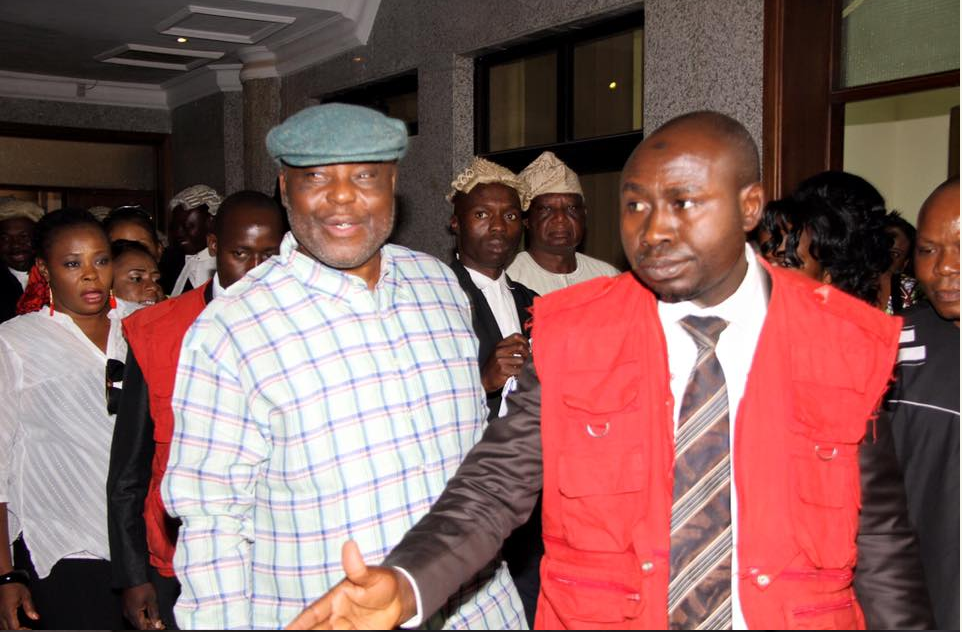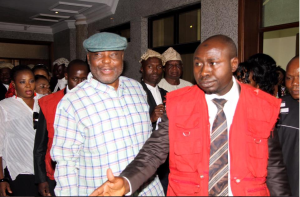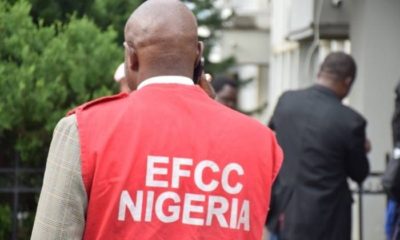Finance
EFCC begins fresh probe into Dokpesi’s N8bn sport deal

Fidelis Soriwei and Ade Adesomoju
ABUJA-The hope of the former Chairman, DAAR Communications Plc, Chief Raymond Dokpesi, of being granted bail by Justice Gabriel Kolawole of a Federal High Court, Abuja, dimmed on Thursday after the Economic and Financial Crimes Commission said it had opened a fresh probe into the payment of N8.4bn to the businessman by the Federal Government.
 Counsel for the EFCC, Mr. Rotimi Jacobs, said this while opposing Dokpesi’s application for bail as canvassed by his lawyer, Chief Mike Ozekhome (SAN), during Dokpesi’s appearance in court in Abuja.
Counsel for the EFCC, Mr. Rotimi Jacobs, said this while opposing Dokpesi’s application for bail as canvassed by his lawyer, Chief Mike Ozekhome (SAN), during Dokpesi’s appearance in court in Abuja.
On Wednesday, Ozekhome had said his client had been in the EFCC custody for eight days, adding that the offences, for which the embattled businessman was standing trial, were bailable.
The judge had adjourned hearing of the bail application till Thursday after the EFCC counsel indicated that he needed time to file a counter-affidavit opposing it.
Dokpesi was on Wednesday arraigned along with his firm, Daar Investment and Holdings Limited, on six counts of money laundering and procurement fraud, instituted against him by the EFCC.
The EFCC charged Dokpesi and DIHL with fraudulent receipt of N2.1bn from the Office of the National Security Adviser between October 2014 and March 19, 2015, for the Peoples Democratic Party’s presidential media campaign in breach of the provisions of the Public Procurement Act, Money Laundering (Prohibition) Act and the EFCC (Establishment) Act.
He pleaded not guilty to all the six counts on Wednesday.
Justice Kolawole had, after the arraignment on Wednesday, ordered that Dokpesi be remanded in the EFCC custody and be produced in court on Thursday for the hearing of his bail application.
During the hearing of the application on Thursday, Ozekhome urged Justice Kolawole to grant bail to his client.
The lawyer argued that the offences, with which Dokpesi was charged, were ordinarily bailable because they were not capital offences.
He said Dokpesi had not, in any way, contributed to any act of insurgency in the country and that he would not jump bail.
Similarly, the defence lawyer contended that Section 36 of the 1999 Constitution presumed his client innocent until the contrary was proved by the prosecution.
Opposing the bail application, however, Jacobs urged the court to reject the application on the grounds that the Federal Government was investigating a fresh allegation of N8.4bn the accused collected for airing the FIFA Under-17 championship, which Nigeria hosted in January, 2012.
Jacobs added that the airing right was given to DAAR Communications by FIFA and the Federal Government was not a party to the contract for which he allegedly collected N8bn from the Nigerian government.
Jacobs said, “Here is a man, who in 2012, collected over N8bn for the contract for airing of the Under-17 World Cup organised by FIFA. Nigeria was not part of the contract agreement with FIFA, yet, this applicant collected the huge sum from the treasury of this country.
“Again, let me say here that Nigeria is bleeding and it is the duty of everybody, including judges in court, to ensure that we fight and put an end to corrupt tendencies in this country.”
He added that granting bail to the accused person would jeopardise investigation into the allegation.
He referred the judge to the affidavit filed in opposition to the bail application, indicating no contract paper was exchanged by Dokpesi and any agent of government when the N2.1bn was paid to him.
In response to the allegations, Ozekhome said Jacobs was being speculative.
He said, “The prosecution counsel is being speculative and giving evidence from the bar. When we get to the bridge, we will cross it and prove that there was no corruption as far the applicant is concerned.”
Ozekhome also told the court that his client was scheduled to travel abroad for medical attention when he received a call, inviting him to the EFCC office in Abuja and that without hesitation, Dokpesi honoured the invitation as a law-abiding citizen.
The senior advocate added that Dokpesi’s son would wed on December 17 and 19 and that as a father, he (Dokpesi) had sent invites to highly-placed Nigerians and as such, he would be around at all times to stand trial.
Jacobs also faulted the health grounds on which the bail application was predicated, arguing that the defence failed to disclose the nature of the ailment.
 He explained that the letter of appointment, issued by the physician and exhibited by the defence, was written on December 5, when the accused was already in the EFCC custody.
He explained that the letter of appointment, issued by the physician and exhibited by the defence, was written on December 5, when the accused was already in the EFCC custody.
Jacobs said Dokpesi might jump bail due to the possibility of being jailed for seven years upon conviction.
But after the hearing on Thursday, the judge said he needed time to study the arguments canvassed by parties for and against the bail application before he could deliver his ruling.
He then fixed Monday for the ruling and ordered that Dokpesi be returned to the EFCC custody.
A large number of women and youths besieged the Federal High Court, Abuja, in solidarity with Dokpesi on Thursday.
The placard-bearing supporters were not allowed entry into the court premises but remained outside the gate throughout the court proceedings.
The judge had, on Wednesday, fixed initial trial dates for February 17, 18, March 2 and 3, 2016.
Meanwhile, there were strong indications on Thursday that the EFCC might invite the former Minister of Finance, Dr. Ngozi Okonjo-Iweala, in connection with its ongoing investigation into the procurement of arms under the past administration of President Goodluck Jonathan.
A source in the commission on Thursday said the commission was also looking into the role of the Central Bank of Nigeria in the release of the funds to the former National Security Adviser, Col. Sambo Dasuki (retd.), and others being probed as a result of the arms deal.
A top operative of the EFCC, who confided in one of our correspondents, said the commission had been working very hard to identify those who received funds from the ONSA because they could not lay their hands on documented evidence in the office.
It was learnt that the invitation, which might be sent to the former minister within a week, was not an indictment, but a move by the commission to get to the root of the arms deal.
Findings showed that Okonjo-Iweala would assist the EFCC in its ongoing investigation into the arms deal.
It was gathered that the 27-man Task Force, set up by the Chairman of the commission, Mr. Ibrahim Magu, had been working on evidence of funds released from the CBN to arrest those who were in the custody of the anti-graft agency.
The source added that while it was true that part of the recovered Abacha loot was spent on the campaign against insurgency at the time, the commission was of the view that not all the money was spent for that purpose.
The source explained for instance that the funds were spent on the procurement of arms for troops and the payment of the South African mercenaries, who trained a Strike Force and supplied intelligence to the military in the recovery of 22 local government areas from Boko Haram shortly before the general elections.
A former Commander of the South African Defence Force, Col. Eeben Barlow, had told the UK Telegraph, that his outfit, known as the Special Tasks Training, Equipment and Protection, trained an elite strike force in Nigeria to aid the campaign against insurgency.
Barlow was silent on the amount of money involved in the deal.
The source said, “You see these things are not as easy as you think. The Office of the NSA does not seem to have the type of documentation that we require to go after those involved.
“The belief here is that while some of the money might have been spent on arms and other security issues, not all of the funds went into that and of course, that is why there is a probe.
“As for the former Minister of Finance, she said clearly in her letter that the former NSA should report to the President on the disbursement of the funds.
“However, her name has been coming up, and there is a strong likelihood that she should be invited to make clarifications. I cannot tell you when but from what I know, she will appear to make clarifications.
“I must tell you that those, who presided over the disbursement in the CBN, will also be summoned to answer questions. Okonjo-Iweala may be invited next week because of the latest revelations.”
Our correspondent could not get the Head of Media and Publicity of the EFCC, Mr. Wilson Uwujaren, to comment on the story as calls to his mobile did not connect.
Okonjo-Iweala had on Wednesday said she transferred $322m from the looted funds recovered from a former Head of State, the late Gen. Sani Abacha, to the Office of the NSA for military operations in the North-East.
The former minister had, in a statement by her Media Adviser, Mr. Paul Nwabuikwu, said the transfer of the fund was approved after a committee set up by former President Jonathan gave approval for the use of the money.
She said based on the decision of the committee, she personally requested that part of the recovered fund be used for security operations while the rest be channelled into developmental purposes.
There was a report on Wednesday that the former minister allegedly diverted N61.4bn from the Abacha loot to Dasuki’s office.
PUNCH-
Business
Nigeria pays US$4.9 billion on petrol subsidy in 2024- NNPCL
It was however noted by Biztellers.com.ng, that although subsidy is back in effect, the main reason for that is the increasingly weak state of the Naira and the country’s extreme dependence on products importation. Also unlike the previous subsidy era, where several oil marketers were getting free subsidy refunds for unverified product importation, this subsidy era is witnessing only one importer, the NNPCL, which in effect is the sole receiver of government subsidies.
Yemie ADEOYE
INSPITE of the official position of the Nigerian government that the controversial petrol subsidy is gone for good as announced by the President on assumption of office, the state owned Nigerian National Petroleum Corporation Limited, NNPCL has disclosed that petrol subsidy is still fully operational in Nigeria, although, under a different identity.
Umar Ajiya, Chief Financial Officer at the NNPCL, disclosed that it cost the company a staggering N7.8 trillion (US$4.9) to cover this price gap in the first seven months of 2024.
Rather than simply referring to these claims as subsidies, he stated that the company is merely managing the price difference in petrol imports on behalf of the federation, stressing that this should not be misconstrued as a return to subsidy payments.
![]() This revelation has reignited discussions on whether the NNPC is indirectly offering subsidies, a concept typically defined as selling a product below its cost price.
This revelation has reignited discussions on whether the NNPC is indirectly offering subsidies, a concept typically defined as selling a product below its cost price.
Documents reviewed by Biztellers.com.ng showed that the term “subsidy” was used extensively in official correspondence between the NNPCL and the presidency, particularly in reference to the “shortfall.”
Recall that President Bola Tinubu reportedly approved NNPC’s request to utilize the 2023 final dividends due to the federation to offset these costs.
However, during a media briefing on Monday about the company’s 2023 audited financial statements, Ajiya refuted claims that the NNPC is involved in any subsidy scheme.
Ajiya further disclosed that the Nigerian government owes the NNPC N7.8 trillion ($4.9 billion) in subsidy-related debts for the period from January to July 2024.
In furtherance of his clarification to the News Agency of Nigeria (NAN), Ajiya insisted that no subsidy payments have been made to any marketer in the last nine years, citing the NNPC’s role as the sole importer of petrol under supply contracts.
He said, “In the last eight to nine years, NNPC Ltd. has not paid anyone a dime as a subsidy; no kobo has been disbursed by NNPC Ltd. in the name of subsidy. No marketer has received any payment from us for subsidy.”
“What has been happening is that we have been importing PMS, which has been landing at a specific cost price, and the government tells us to sell it at half price. So the difference between the landing price and that half price is a shortfall.
“And the deal is between the Federation and NNPC Ltd., to reconcile, sometimes they give us money, so there is no money exchanging hands with any marketer in the name of subsidy.”
Ajiya remained silent on how much of the $4.9 billion could have been remitted to the federation account if the NNPC had not been covering the “shortfall.”
It was however noted by Biztellers.com.ng, that although subsidy is back in effect, the main reason for that is the increasingly weak state of the Naira and the country’s extreme dependence on products importation. Also unlike the previous subsidy era, where several oil marketers were getting free subsidy refunds for unverified product importation, this subsidy era is witnessing only one importer, the NNPCL, which in effect is the sole receiver of government subsidies.
Banking
CBN Denies Currency Devaluation

The Central Bank of Nigeria (CBN) has refuted claims of devaluing the.
Earlier reports suggested that the CBN had devalued the Naira, lowering its exchange rate from N631 to the dollar, compared to the previous day’s rate of N461.60 at the Importers and Exporters (I&E) window.
However, the Central Bank of Nigeria (CBN) released a statement on Thursday through its Acting Head of Corporate Communications, Dr. Isa Abdulmumin, categorizing the report as false information.
In the statement titled ‘CBN Has Not Devalued The Naira’, he said the attention of the apex bank was drawn to the news report by an Abuja based newspaper edition of June 1, 2023, titled “CB Devalues Naira To 630/51”.
However, the CBN stated categorically that the news report was replete with outright FALSEHOODS and destabilizing innuendos, ‘reflecting potentially willful ignorance of the said medium as to the workings of the Nigerian Foreign Exchange Market.’
“For the avoidance of doubt, the exchange rate at the Investors’ & Exporters (I&E) window traded this morning (June 1, 2023) at N465/USS1 and has been stable around this rate for a while.
“The public is hereby advised to ignore the news report by Daily Trust in its entirety, as it is speculative and calculated at causing panic in the market,” the CBN spokesman added.
He, therefore, advised media practitioners to verify their facts from the Central Bank of Nigeria before publishing in order not to misinform the public.
Banking
BREAKING: CBN Increases Interest Rate By 0.5%

The interest rate in Nigeria has been raised to 18.5 percent, up by 0.5 percent, from 18 percent where it was pegged in March 2023.
The Central Banks of Nigeria’s (CBN) Monetary Policy Committee (MPC) resolved to this effect at its third meeting of 2023 in Abuja, on Wednesday.
Governor, CBN, Godwin Emefiele, made the disclosure in the communiqué of the MPC’s meeting, thereafter.
While engaging the media at the end of the two-day meeting, Emefiele, said the committee voted to keep the asymmetric corridor at +100 and -700 basis points around the MPR.
In the view of the MPC, rising inflation rate is traceable to the high energy cost and challenges around the supply chain, among others, which lie outside the corridors of the CBN.
Emefiele said, “The current trend in price development would continue to be monitored by the bank with greater collaboration with fiscal authority to address the drivers of inflation.”
Biztellers reports that the CBN had effected six consecutive interest rate increases, which has seen the rate move from 11.5 percent in March 2022 to 18.5 percent in May 2023.
















